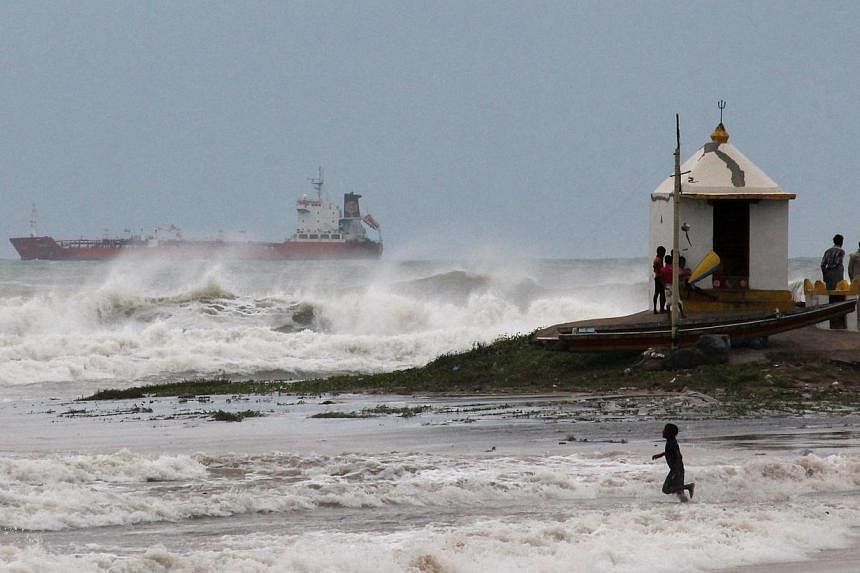BHUBANESWAR, India (AFP) - At least three people were killed on Sunday when Cyclone Hudhud slammed into India's east coast, packing winds of almost 200 kmh, ripping down power cables and forcing roads and railways to shut.
Around 370,000 people living along the eastern coastline were evacuated before the storm hit around 11.30am on Sunday morning, as the authorities tried to avoid mass casualties.
"We have had three deaths since this morning," said Mr Natrajan Prakasam, a Disaster Management Commission official in the worst-hit state of Andhra Pradesh in south-east India. Two people were crushed by falling trees, while the third was killed when a wall collapsed in heavy rains, he told AFP.
India placed its navy on high alert and evacuated people from eastern coastal areas as it prepared for the severe cyclone to hit on Sunday.
Cyclone Hudhud was expected to make landfall before noon local time, packing winds of nearly 200km per hour.
Thousands of people living in flimsy housing in fishing villages in the eastern state of Andhra Pradesh were among the first to be moved to concrete relief shelters, officials said. Mr Arvind Kumar, a state government official in Andhra Pradesh, where the storm will hit first, said 300,000 people had been evacuated there. "We are trying to minimise the movement of people," he said as the storm gathered strength over the Bay of Bengal. "Six hours after landfall will be very crucial, though the wind speeds will come down to about 100 kilometres (per hour) by then."
Mr Prabhat Mohapatra, deputy relief commissioner for the neighbouring state of Orissa, said nearly 50,000 people had been evacuated from there. "Some are being evacuated this morning," he told Indian broadcaster NDTV. "We are worried about flooding here (Orissa) and have depleted our water reservoirs by 50 per cent."
India's eastern coast and neighbouring Bangladesh are routinely hit by bad storms between April and November that cause deaths and widespread property damage.
The authorities are keen to avoid a repeat of Cyclone Phailin, which killed at least 18 people in Orissa last year and left a trail of destruction.
In 1999, more than 8,000 people were killed when a cyclone battered Orissa.
Prime Minister Narendra Modi chaired an emergency government meeting late on Saturday to review preparations for the cyclone.
Some bus and train services in Andhra Pradesh and Orissa states have been cancelled, the Press Trust of India (PTI) said.
The navy said it has "assumed a high degree of readiness" as "the severe cyclone Hudhud is poised to strike".
Naval ships are standing by equipped with "divers, doctors, inflatable rubber boats, integral helicopters and relief material," the statement said.
A nine-year-old girl drowned and a boy is missing after the boat that was evacuating them from their coastal village capsized on Saturday, Andhra Pradesh Chief Secretary G C Patie told PTI.
The authorities in Orissa have been working to evacuate members of the state's 7,000-strong Bonda tribe from their age-old habitats in the Bonda Hills, expected to be particularly hard hit by the storm.
But PTI said many were reluctant to move as they had never left the area.
"The identified 2,000 tribal people (who must move) have never come down the hills in their lifetime," Mr Dambaru Sisa, a member of the state Parliament who belongs to the Bonda tribe, told the agency.

